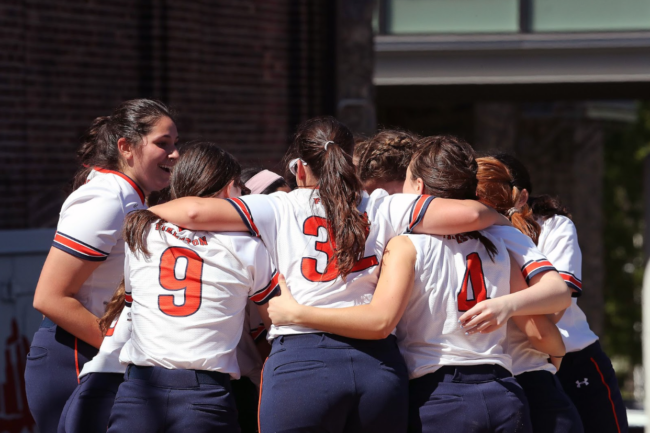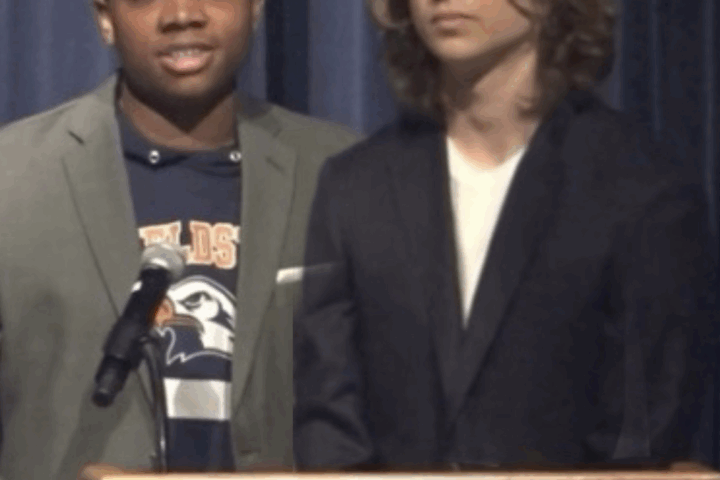After fifteen athletic seasons and roughly 148 games, my time as a student-athlete has come to an end. Growing up in a family of Fieldston athletes, Eagle pride is ingrained in who I am. Although I will never put on a Fieldston uniform again, I am confident I will continue to wear blue and orange for the rest of my life (anyone who knows me knows that half of my wardrobe is purely Fieldston merch).
Over the past few months, I reached out to six of Fieldston’s many female athletes and asked them about their experiences playing their sports. Continuing my three-part series on female athletics and Title IX, I also asked the athletes what they knew about the legislation. To my surprise, many athletes did not know what it was and a couple of them had never even heard of the term before.
Lily Burnside (IV), a field hockey, indoor track and softball athlete, admitted she does not know much about Title IX, but she knows that, as a female athlete, it has made her life easier and is glad she was born after it was put into law.
Field hockey, basketball, indoor track, and softball player Savanah Carasquillo (VI) said that, after learning about Title IX, she has become grateful for the athletic opportunities it has allowed her to have; however, she specifically brought up the United State’s women’s Olympic soccer team “debacle,” as she is “aware that even though there are women in sports, the female athletes are not actually being treated equally.”
In 2014, Always, a brand of menstrual products, released a #LikeAGirl campaign to promote confidence in young girls. For many people, specifically female athletes, these videos have stuck with us and altered our way of what being a female athlete means to us.
Before playing field hockey for Fieldston, sophomore Lily Saal played four years of baseball and two years of softball. On her co-ed baseball team, she would receive discouraging comments from the opposing team like “The girl is pitching! The girl is pitching!” Instead of taking this unnecessary commentary as insulting, Saal used it as fuel. As she walked off the mound, Saal would turn to the other team’s dugout and say “Yeah, the girl is pitching and she just struck you all out.” For Saal, being a female athlete means that she has to be competitive and resilient. Saa;’s mindset is that when playing a mixed-gender sport, little comments and errors cannot impact you. And if they do, they will get in your head and unconsciously make you conform to the stereotype that girls cannot play sports.
For soccer player Cassidy Cribbs (VI), being a female athlete “means always competing to the fullest and dedicating [herself] to [her] sport.” For many, regardless of gender, athletics is a stress reliever and a way to express ourselves.
Soccer and lacrosse player Caroline Morris (V) said that for her, “It is not just about success and winning championships—though this is the goal—it is really about feeling stronger and healthier, creating friendships, improving as a player, and feeling confident in yourself.” Morris added she also feels a responsibility to inspire other athletes, specifically the younger generations, “both as a competitor and someone who demonstrates good sportsmanship.”
As much as I have enjoyed playing for Fieldston, I, along with many others, believe that changes need to be made to the environments both in and surrounding Fieldston’s athletic culture. Saal questions if the environments between the gendered teams are different due to the number of girls who try out for a team and how many of the female teams do not make cuts for the junior varsity team. Saal believes that if more female teams had cuts, “there would be more intensity and competition.”
On a more positive note, Morris has “observed that at both collegiate and high school levels of athletics, the team culture on the female side tends to be more unified, supportive, and unselfish” and tends to be “more cohesive than men’s teams.”
As much as the athletic department tries to equalize the engagement of the Fieldston body with each team, Burnside believes “there is more of a fan base with the male teams.” Burnside feels that, come the postseason, Fieldston students do a good job supporting the success of each team. However, during the regular season, Burnside believes that there is inequality in the attention and support each team receives.
In 2021, Girls Varsity Soccer won NYSAIS for the first time in Fieldston history! And yet, the acknowledgement they received from the student body was minimal to Fieldston’s hockey team’s “hyped walk out on the quad during advisory with lots of support before their rival game against Riverdale with their names announced, a pinata, and tons of confetti.” As a member of the 2021 NYSAIS championship team herself, Morris admitted she “never experienced the equivalent as a female athlete at Fieldston.” Whether this is the case because Fieldston’s female athletes tend to be more humble and do not orchestrate hyped quad walkouts or if it’s the student body’s lack of support, there is a distinction between many of the different gendered teams.
During my conversations with both coaches and athletes, we all agreed that game advertisements for all sports need to be increased. Carrasquillo added, “I don’t think as many people would show up to a girls’ game unless you’re telling them to.” Whether this means weekly emails sent out to the community about game results or teams reposting other teams’ Instagram posts, Fieldston athletes need to show more love for each other. As much as I would like to do so, being a three-season athlete made it almost impossible to find the chance to attend another team’s games. And I know this is the case for many others as well. However, I think many people forget that there are other ways to show up for our peers.
Many female athletes at Fieldston and beyond feel that they are often overlooked and their successes are not recognized enough. My departing wish to the Fieldston community, athlete or not, varsity player or not, is to give every team equal support and recognition. Whether or not a team has a winning record, each team is composed of athletes who put in hours of their time to work their bodies to their limits. So please, let’s all agree to stop making fun of another team, or even your own team, after a big loss or making bigoted statements like “If I tried out for girl’s varsity I would be a starter.” Come fall, I plead that everyone promises to do a better job of lifting each other up and supporting one another.
As I move on and leave my days as a Fieldston student behind, regret has started to form for all the amazing opportunities I missed out on. I cannot stress this enough: support your peers. Whether it’s your teammates, another team, classmates in the musical or friends in the jazz ensemble, we as a community are stronger when we support the success of every individual. So, if you hear chatter about a performance or game coming up, try to get ahead on your homework so you have time to cheer on your fellow Fieldston Eagles.









